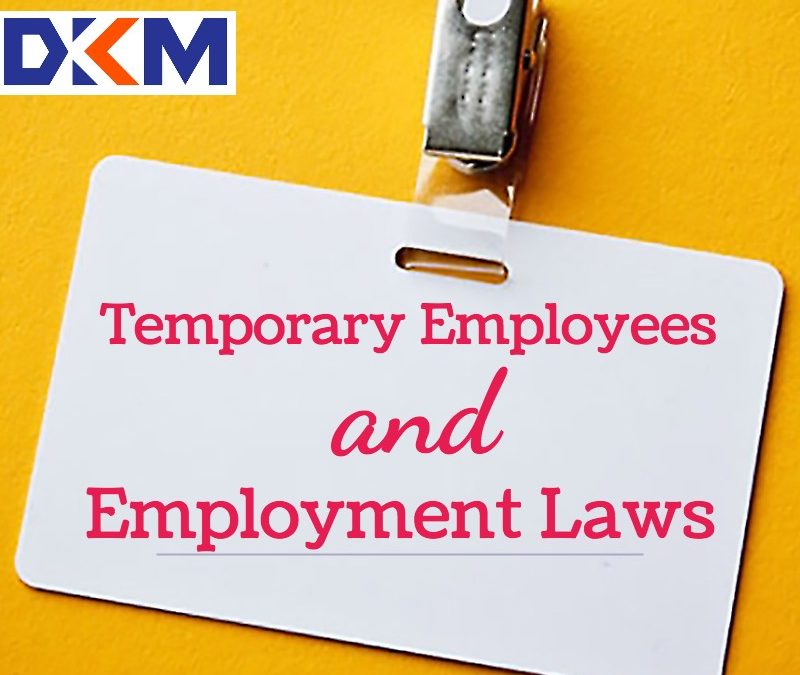Temporary Employees are defined as individuals typically hired to help a business meet increased short term demand for its product or services that do not have the status of permanent staff. Temporary Employees are sometimes referred to as “contractual”, “seasonal”, “interim”, “casual staff”, “outsourcing”, “freelance”; or the word may be shortened to “temps”.
There are certain employment laws for temporary employees and any organization looking to hire temporary employees needs to abide by the laws. Let us understand the temporary employees and the employment laws for the same.
Understanding the term Temporary Employees
- Temporary employees are the ones who fulfill the vacant positions for certain time duration when the company’s permanent staff has either gone on long leaves or in times of excess boom in the industry. Such employees are often termed as contract labor or contracted employees.
- When the basis of employment is for duration of time period, those employees are called as temporary employees. These employees are the need of an hour, they are given employment when demand is increased.
- Temporary employees cost less to a company than permanent staff. But a company cannot make its own rules for temporary employees, there are certain laws anchoring temporary employees.
Employment Law
Few Acts safeguarding the interests of temporary employees are:-
- Contract Labor (Regulation and Abolition) Act, 1970
- Minimum Wage Act, 1948
Contract Labor (Regulation and Abolition) Act, 1970
Applicability
Contract Labor law is applicable to,
- Every establishment where 20 or more workers are employed or were employed in the previous year as contract labor.
- Every contractor who employees or had employed 20 or more workmen during the previous year.
Here, the establishment where the employee works is referred to as principal employer. And the contractor who supplies seasonal employees is the staffing agency referred to as secondary employer.
Registration
- It is obligatory on every contractor to obtain a valid license from the licensing officer before executing any work through contract labor.
Minimum Wages
- It is obligatory on the principal employer to see that the wages of the workers are paid every month on a fixed date and time, before the expiry of 2nd working day.
- Contractor should pay minimum wages to workers as defined under the Minimum wages act.
Maintenance of Records and Registers
By Both,
- The Principal Employer: – Register of Contractors, Certificate by Principal Employer, Annual Return, Notice of Commencement/Completion of work, Notice under Rule 81(1) showing rate of wages, date of payment of wages, wage period, date of payment of unpaid wages etc.
- And the Contractor: – Application for license, original and copies of License, Notice of Commencement/Completion of work , Renewal of License, ID card etc.
Minimum Wage Act, 1948
Payment of Minimum Wages
- Every contractor must pay minimum wages to every contract employee/worker in scheduled employment.
- Every contractor except the minimum wages should pay overtime also for every hour worked above the time duration by an employee at a rate of twice the rate of minimum wages.
Maintenance of Records and Registers
- Muster Roll
- Wage Register
- Wage Slips issued to Employees.
Responsibility of payment of minimum wages to Contract Labor
- Contractor shall be responsible for the payment of minimum wages to contract labor at fixed date and time.
- Every principal employer should appoint a duly authorized representative to be present at the time of disbursement of wages by the contractor and shall certify all the amounts paid by him.
- And it shall be the duty of the contractor to disburse the amount of wages in front of authorized representative.
Thus, temporary employees are safeguarded equally as permanent employees under various employment laws in India. And that is why it is equally important to hire temporary employees as per the employment laws. DKM Online strictly follows the HR and Labor Compliances and also facilitates your team to decode the state and national labor laws and execute HR operations as per the governments guidelines and compliances. You can seek help from our HR department by writing to, hr@edkmonline.com

